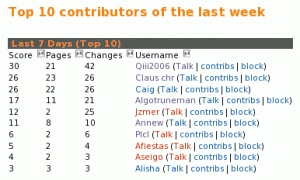UserBase is not just for English-speakers!
Current Statistics
It’s a while since I wrote about UserBase, but there’s been plenty of activity. Let’s look at some statistics, first. We now have 1,212 content pages and 1,236 uploaded images. There have been 10,889 page edits since UserBase began – and that will already be out of date by the time you read this. We have 1,459 registered users, of which 20 have contributed this week. A year ago that statistic was a mere handful. The total number of views is now 2,764,290! Kontact is the most-viewed page – well ahead of the Welcome page – and Akonadi has passed GPU-Performance! A sign of the times, perhaps.
Once again the top three places in the Contributions table go to translators. New contributors since last I wrote are Jzmer, writing about Kimpanel, Afiestas who has undertaken to get the Kbluetooth page sorted out, Aseigo who is writing about Plasmate and Algotruneman – a student on our recent UserBase Editing Klassroom course, who has taken on the difficult twin pages of Krdc and Krfb.
Parlez-vous anglais?
As UserBase has grown, so some of it has become unwieldy, difficult to find for those new to the site, so we have a new initiative to help navigation. Every English page now carries a Category field at the bottom. Clicking on that takes you to a page where you can see the list of all pages in the same category. With a little more work that promises to be very useful. But what if you are a user with little English, or, even worse, poor skills at reading Latin script?
Clearly we have to do the same categorisation for other languages, but they mustn’t be presented with an English category name. At the same time, we need standardised category names, to avoid making still more complications, so, after consultation with involved translators we decided that we must make a table of names and ‘approved’ translations. Hans Chen kindly dented for me, and many people responded quickly,so that we now have 20 out of 31 languages entirely or almost entirely translated in the Category tables. If you command another language, please take a look at http://userbase.kde.org/Translation_Help_Needed and follow the link to your language, to see whether any more help is needed.
This is just the start of our ‘other language’ support. We plan to offer translated page names too, which will also mean that searches in other languages will be more successful. A new tool to make translations easier to manage will be installed shortly, and we’ll put up a page on how to use it. On-line and off-line translations are supported. Currently there are many pages with almost no language support, and some translated pages are over a year out of date – something we need to address. Hopefully this tool will take some of the hassle out of it. If all goes to plan you will see the start of this within the next few weeks.
What else? Well, the mediawiki engine is to be updated, probably to the same version as is used by Wikipedia, and, oh yes! A whole new look, based on our new kde.org website, is planned. Of course our wonderful web team need to draw breath first 🙂
3 Comments
RSS feed for comments on this post.
Sorry, the comment form is closed at this time.

I don’t want to be picky, but in French, a space character is mandatory before some punctuation items, and the question mark is one of them ;).
@Cypher
You don’t necessary need a space before a question mark. The norm is to use an ‘espace fine’. When using software where it isn’t supported, Europeans use a normal space, but the Canadians then choose no space at all.
From http://www.druide.com/points_de_langue_13.html
Signes de ponctuation haute : ; ! ? “»
Le deux-points est précédé d’une espace insécable.
Mon objectif_: la médaille d’or.
Le point-virgule, le point d’exclamation et le point d’interrogation sont, en typographie soignée, précédés d’une espace fine, qui est toujours insécable.
Cette espace fine n’est malheureusement disponible que dans les logiciels spécialisés du monde de l’édition. À défaut d’espace fine, on recommande en Europe francophone d’utiliser l’espace insécable habituelle, tandis qu’au Québec on recommande plutôt de ne pas mettre d’espace du tout.
Sa mère est catholique_; son père, protestant. (Europe)
Sa mère est catholique; son père, protestant. (Québec)
Que c’est beau_! Merveilleux_! (Europe)
Que c’est beau! Merveilleux! (Québec)
Qui est-il_? Que veut-il_? (Europe)
Qui est-il? Que veut-il? (Québec)
Interesting, thanks. I did check such books as I still have, including one pocket-book of business French. None of them use a space before the question mark. Still, that’s fairly OT. :-: